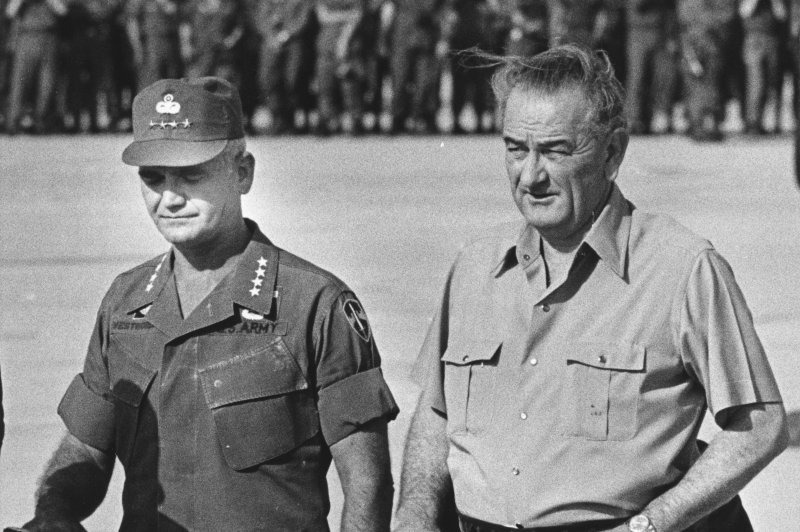1 of 2 | Original caption: 12/23/1967-Cam Ranh Bay, South Vietnam: President Johnson hangs onto a handrail at the back of a jeep as he reviews the troops at Cam Ranh Bay, 190 miles north of Saigon. Standing next to the president is General William Westmoreland. (UPI Photo) |
License Photo
Two and a half years ago, the specter of preemptive military action against Iran to halt its nuclear ambitions loomed. Citing President Lyndon Johnson's ultimately catastrophic decision to use the Tonkin Gulf incidents as the reasons for launching retaliatory air attacks against North Vietnam that would trap America in a quagmire, this column argued caution in not provoking an unnecessary crisis with military strikes. Fortunately, diplomacy has so far produced a Joint Comprehensive Plan of Action that, if fully implemented, will prevent Iran from ever obtaining nuclear weapons.
The lesson that should be learned is that every war the U.S. has started -- including the second Iraq War -- it has lost. And other parallels exist between President Johnson and the Vietnam War and President Barack Obama's promise to "disrupt and destroy the Islamic State." LBJ never resolved the contradiction between his desire to end the Vietnam War with his inability to win it. The tragic compromise was gradual escalation that led to the deaths of over 58,000 American service personnel and countless Vietnamese.
In early 1968, distraught and emotionally crippled by the war, Johnson informed the nation that he would not seek a second elected term "as your president." He was a beaten man. And Johnson's anguish over the war undoubtedly contributed to his early demise.
Obama cannot run for another term. And Obama clearly is not suffering from the same degree of anguish as Johnson did, in part because American casualties have been a fraction of the Vietnam War's and because Obama has made good on his campaign promises to extricate America from Afghanistan and Iraq. Yet, for whatever reasons, the president has become defensive, lackluster in making the case for his strategy other than asserting it is working and, worst, unwilling to accept its self-evident failings in defeating IS.
In that regard, Obama and Johnson may share a common desperation in being unable to reconcile the contradictions that led to defeat in Vietnam and are plaguing the United States in combating IS. Ending IS rests in resolving three sets of contradictions that so far have been both elusive and largely ignored.
The first relates to eliminating the breeding grounds and the source for IS.
The second involves deciding whether the top priority is to eliminate Syrian President Bashar al Assad's rule or to defeat IS while reconciling common and conflicting interests with Russia and Iran, who currently have the largest anti-IS capability in Syria of any outside powers.
Third is balancing Turkish animosity towards the Kurds while utilizing Pesh Merga and other Kurdish forces to defeat IS.
Decades of unspeakable Sunni versus Shia and Shia versus Sunni violence in Iraq have metastasized IS. Unless and until reconciliation between the Shia majority and Sunni minority is established, IS will have a permanent source of recruits and a home base from which to expand. So far, the Baghdad government has been incapable or unwilling to reach accommodation with the Sunni minorities.
The administration cannot deliver on its demand that Assad must go as a prerequisite for defeating IS and at the same time rely on Russia and Iran to support the U.S.-led coalition against IS. The administration also argues, wrongly in my view, that Assad is the major factor in the rise of IS. But its bombing and drone campaigns are surely creating as many enemies as are being killed. Hence, these contradictions remain.
Last, the rift between Turkey and the Kurds limits the degree to which the latter can be used in the fight against IS.
Whether Obama is in denial over these contradictions or implacably believes that his strategy is working is unclear. It could be both. Yet, without recognizing these realities, Obama is repeating LBJ's errors that led to defeat and humiliation in Vietnam.
The next president will not be inaugurated for another 14 months. It will take at least six to 12 months for that administration to form and be fully capable of dealing with the crises and conflicts it faces, notably IS. Unfortunately, two years is too long to wait.
At best, the coalition is not losing the war against IS. At worst, as the Communist and Nazi parties succeeded in turning Russia into the Soviet Union and Germany into Hitlerism, IS could spread its Caliphate to other states in the region. This is not another hypothetical Domino theory that got us into so much trouble in Vietnam. But it is plausible and should worry us greatly.
________________________________________________________________________
Harlan Ullman is UPI's Arnaud de Borchgrave Distinguished Columnist; Chairman of the Killowen Group that advises leaders of government and business and Senior Advisor at Washington DC's Atlantic Council and Business Executives for National Security (BENS). His latest book is A Handful of Bullets: How the Murder of Archduke Franz Ferdinand Still Menaces the Peace.















